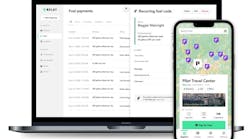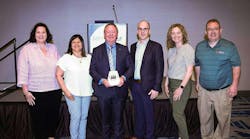The Federal Motor Carrier Safety Administration (FMCSA) will implement a safety permit program for carriers hauling hazardous materials in interstate and intrastate commerce, as outlined in the final rule published in the Federal Register today [Docket No. FMCSA-97-2180]. The rule is effective July 30 with compliance required beginning January 1, 2005.
To obtain a haz-mat safety permit motor carriers must have a “satisfactory” safety rating, a sufficient security program in place, be in compliance with haz-mat regulations, and be registered with the Dept. of Transportation’s Research and Special Programs Administration (RSPA).
Additionally, FMCSA is maintaining the written route plan required for radioactive materials. While a permitted material is in transportation, the driver must readily have available the telephone number of the dispatcher or manager knowledgeable of the route of the vehicle.
FMCSA is requiring companies holding haz-mat safety permits to develop a communications plan that allows for the tracking of the shipment. A record of communications must be kept containing the time of the call and the shipment location for at least six months.
Shipments containing highway route-controlled Class 7 radioactive materials are required to undergo pre-trip inspection performed by a federal, state, or local inspectors, or one that is contracted by the aforementioned levels of government.


